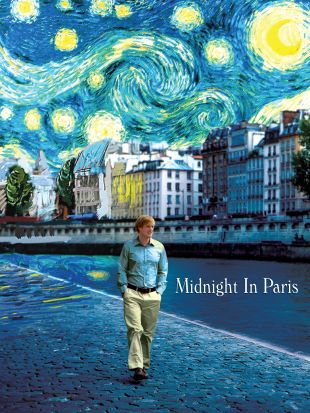
With less than memorable work like Scoop, Anything Else, and The Curse of the Jade Scorpion under his belt, Woody Allen appeared to have lost any real fire for directing comedies. While dramas like Match Point seemed to tickle his muse, his comedies have become perfunctory at best, and downright lazy at worst. That's what makes the endlessly amusing and sneakily profound Midnight in Paris such a wonderful surprise.
The movie stars Owen Wilson as Gil, a successful screenwriter who's in Paris with his fiancée, Inez (Rachel McAdams). Gil is trying to finish his first novel, and he draws inspiration from the city because his fantasy is to live in the Paris of the 1920s, rubbing shoulders nightly with heavy hitters like Cole Porter, Pablo Picasso, and other legendary artists. Amazingly, one night while he's out alone on a walk, there must be magic in the air since his time-traveling dream comes true. Soon he's getting advice on his writing from Gertrude Stein (Kathy Bates), befriending Zelda Fitzgerald (Alison Pill), and learning how to love truly from Ernest Hemingway (Corey Stoll). And Gil needs direction in his love life more than ever after he falls for costume designer Adriana (Marion Cotillard) and begins to sense that he and Inez may not be so well matched.

Owen Wilson manages to deliver Woody's patented dialogue without imitating his iconic delivery outright, and he's ideally cast because he can project awe and wonder with his wide, friendly face. Gil's a fanboy, but instead of comic books or Star Wars he's got a fetish for Paris in the Roaring '20s. And because he's having such an amazing time living out his wildest dream, we can't help but share in his goofy delight.
Wilson is far from the only performer to win us over, though. Stoll scores big laughs with his interpretation of Hemingway; Woody has written this character's dialogue as a spot-on parody of/tribute to Papa's distinct prose, and Stoll delivers every line with a no-nonsense authority that accentuates the humor. Pill has a field day with Zelda's motor-mouthed speech patterns and mental instability, and Adrien Brody gets some of the biggest laughs in a cameo as Salvador Dali.

The film's friendly vibe can be felt in every aspect of the production. Cinematographer Darius Khondji accentuates Paris' dreamlike qualities whether it's day or night -- or the 20th or 21st century. The lighting, both indoor and out, has a golden hue that amplifies Gil's romanticism -- Khondji even makes rain seem warm and inviting.
Allen has dealt with the pleasures and dangers of romanticism before. The Purple Rose of Cairo celebrated the power of the movies to take us away from our problems, before reminding us that escape is impossible. Everyone Says I Love You celebrated an idealized world that had nothing to do with the troubles real people face. The closest Allen came to showing how to live like a romantic in a world full of pain and dissatisfaction was Manhattan -- a film that is arguably his best and ends with a wise teenager reminding Woody's middle-aged character that you have to have a little faith in people. Midnight in Paris tweaks that formula by making it about a writer who needs to have faith in himself, and it teaches that lesson with a warmheartedness that Allen hasn't displayed since Radio Days.
Calling the 42nd feature film by a director in his mid-seventies "mature" may seem both inappropriate and insulting, but Woody Allen's comedy Midnight in Paris is a superior late-period work precisely because it appears that age and wisdom have finally allowed him to discover that his romantic streak can acknowledge his realist/cynical side without succumbing to it.
